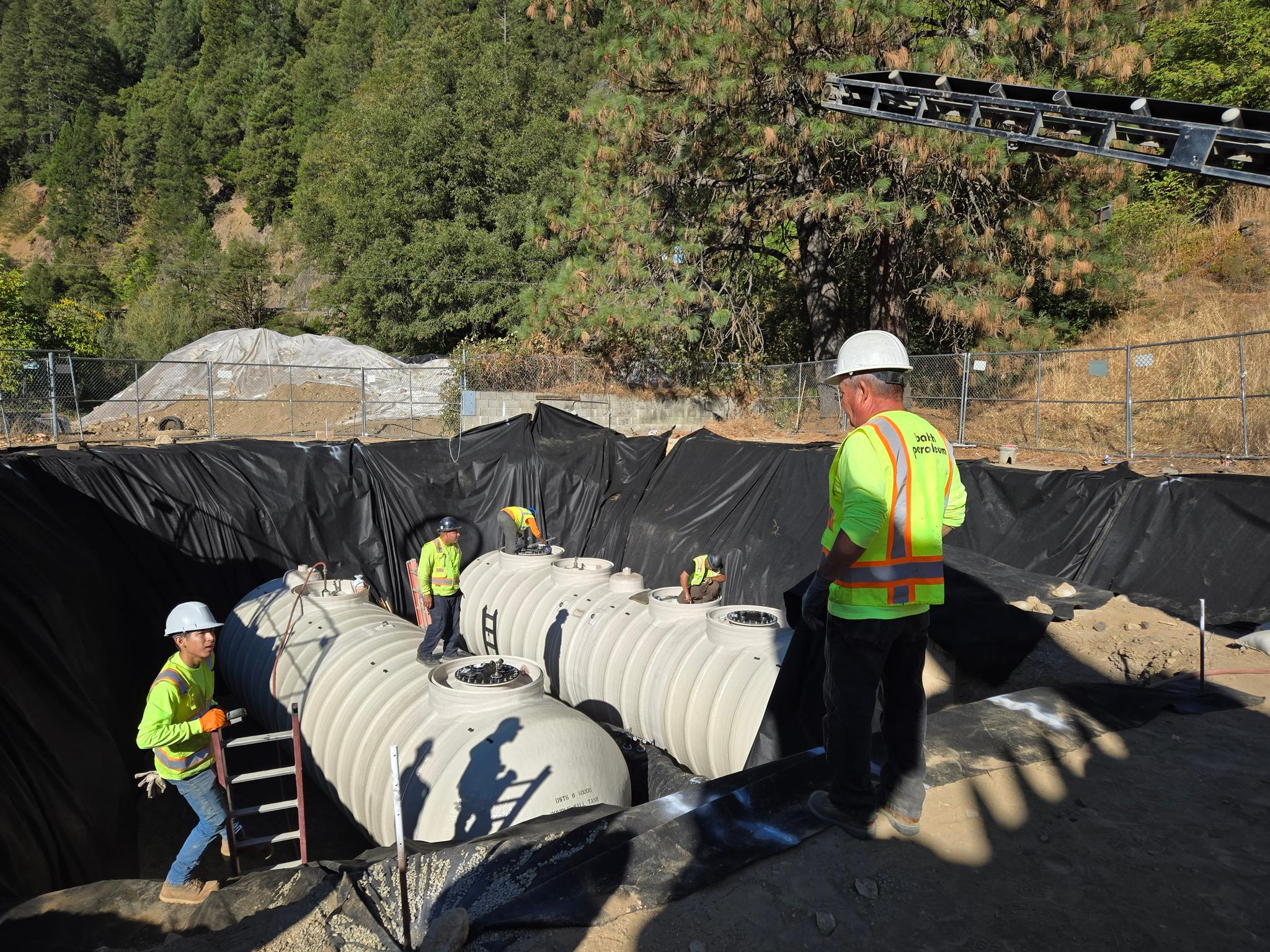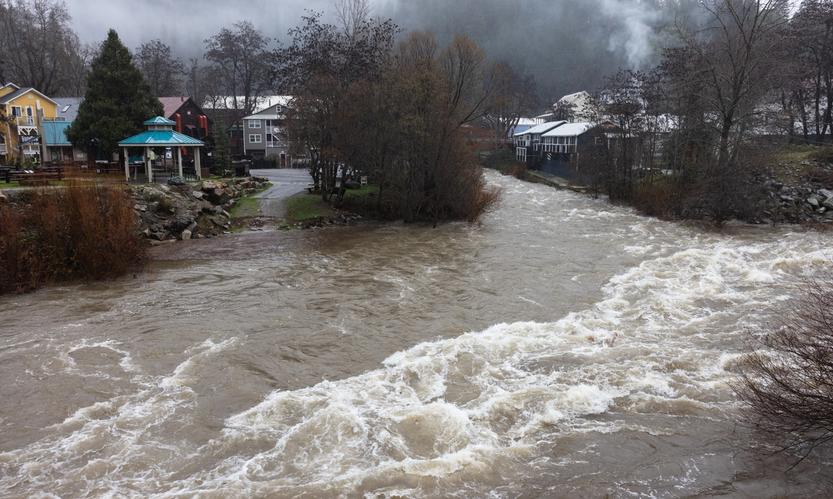Downieville Gas Returns Amid California’s Green Push
October 16, 2024

Workers install gas tanks for the Downieville Gas Station on Tuesday
DOWNIEVILLE — The Downieville Gas Station moved ahead with installing new fuel tanks on Tuesday. While the step marks excellent progress toward the return of gas in Downieville, it comes amidst a push in California towards zero-emission vehicles, which has driven prices at the pump to a boiling point.
On Monday, October 7th, California Senate Democrats blocked a bill by Senator Rosilicie Ochoa Bogh (R-Yucaipa), which would have suspended the state’s gas tax. According to AAA, California pays nearly $1.50 more per gallon than the national average, at $4.67 compared to $3.21. That disparity is worsened in Sierra County, which has an average gas price of $5.40, the third highest in the state behind Mono and Alpine Counties. California prices have steadily increased over the years, outpacing other states, though they are down from recent all-time highs in 2022 of well over $6.
California’s gas tax is 68.1 cents per gallon, the highest in the country. Additionally, the state’s cap-and-trade program, by requiring pollution-producing power plants to buy allowances to offset emissions, is estimated to increase gas prices by around 30 cents, according to the California Legislative Analyst’s Office. Several other environmental policies contribute to price at the pump, and more policies regulating refineries and their products are being implemented.
This week, the California assembly passed the ABX2-1 bill, which introduces sweeping regulations that can limit or deny refineries’ ability to perform scheduled maintenance and may require them to keep a certain amount of fuel reserved to offset any maintenance shutdowns. The Independent Consumer Fuels Advisory Committee (ICFAC) would have power over maintenance scheduling and reserve levels.
Governor Newsom appointed five democrats and one registered without party preference to the 6-person ICFAC:
Martha Dina Arguello is the Executive Director at Physicians for Social Responsibility – Los Angeles, an organization with a vision to “build just futures beyond fossil fuel” and “create healthy and green economies for all.” That vision includes banning all oil drilling in Los Angeles and all “neighborhood oil drilling” statewide.
Michael Jorgenson serves as the Supervisory Deputy Attorney General in the Antitrust Section of the California Department of Justice. His department recently sued several big oil companies for damages perceived to be caused by climate change, demanding payment for superstorms and wildfires, impacts of extreme heat, dwindling water supplies in extreme drought, and fortifying infrastructure and homes against sea level rise and coastal and inland flooding. The lawsuit also seeks to “prohibit oil companies from engaging in further pollution” and would impose financial penalties for what the state believes is deception and misinformation from the companies.
Neal Mahoney, a Stanford Professor of Economics, was a Special Policy Advisor for Economic Policy at The White House from 2022 to 2023 — presiding over an inflation crisis. Mahoney also worked on health care reform under Obama from 2009 to 2010.
Deborah Meeks, the US West Coast Policy and Business Coordinator at Shell, describes herself as wanting to “be an advocate for change as California takes the lead in the US to become Net Carbon Neutral.” She clarifies that change must progress “at a pace that can be managed smartly – through proper safety, reliability for all and sound economics.”
Norman Rogers, the only member not registered as a Democrat, is Second Vice-President at United Steelworkers Local 675 and a former firefighter. He has advocated for worker concerns about transitioning away from “dirty” fuels. He has also argued that the best way to support workers impacted by California’s transition is to invest in state projects moving those workers into green energy fields.
Astrid Zuniga is the President of the United Domestic Workers/American Federation of State, County and Municipal Employees 3930. She is also a California Democratic Party Executive Board Member. Zuniga primarily advocates for increasing safety in interactions between people with disabilities and law enforcement.
Newsom hopes this bill will increase the stability of gas prices statewide, particularly during maintenance when prices spike due to low supply and oil companies experience increased profit margins. Newsom blames these shutdowns and a “suspicious market transaction” for 2022’s high gas prices. However, the US Energy Information Administration found that the Russian invasion of Ukraine was the most significant contributor to the increase at that time. Still, in his signing statement, Newsom claims that price spikes have cost Californians “billions of dollars over the years,” and that the bill was “taking action to prevent these price spikes and save consumers money at the pump.”
The bill, however, would likely increase administrative costs for refineries, which could be passed on to the consumer, but no analysis of its effect on price at the pump could be found. It also gives the state control over whether a refinery can shut down for scheduled maintenance, which some have argued could discourage regular maintenance and be a detriment to worker safety. Regardless, the bill gives a significant amount of control over how refineries operate to Newsom-appointed board members who generally do not favor the use of fossil fuels.
Now, a new Low Carbon Fuel Standard amendment, which significantly increases carbon impact standards in fuels to align with the state’s aggressive carbon neutrality goals, is making its way through the California Air Resources Board (CARB) approval process. CARB’s initial analysis indicated that the change would add 47 cents per gallon at the pump, but the board has since refused to update its analysis.
Sierra County’s frequent power outages, challenging terrain, and cold winters make electric vehicle adoption, in its current form, undesirable to many in the area. California’s goal is for all new passenger cars, trucks, and SUVs sold in California to be zero-emission vehicles by 2035, and state-funded programs aim to increase infrastructure in rural areas. However, the only publicly available electric vehicle charging stations in Sierra County are installed in hotels. Electric vehicles themselves also remain prohibitively expensive for a large portion of residents.
Having the 10th lowest median household income by county in the state and third highest average gas price, Sierra County residents already spend a disproportionately large amount of their income on gas. Residents also drive frequently, having an average commute of 28 minutes and often needing to drive over an hour for groceries. Though both Downieville’s residents and visitors will welcome the return of gas and diesel, the ever-increasing prices are a reminder that California is on a path to getting rid of it for good.
Featured Articles

Storms Bring Heavy Rainfall and Local Disruptions →
December 22, 2025
Sierra County faces power outages and water issues amid heavy rainfall and storm warnings.
215 Animals Seized for Cruelty from Grass Valley Property →
December 22, 2025
Human Remains Found Near South Yuba Bridge in March Identified →
December 17, 2025
Transfer Station Burn Suspended After Community Concerns →
December 16, 2025
Sierra Hardware Plans Extensive Repairs After Flood Damage →
December 8, 2025